

Welcome to Forbes. The Facebook Emotions Study Controversy. The emotion-manipulation study conducted by Facebook has drawn a lot of attention in the last week, much of it negative.
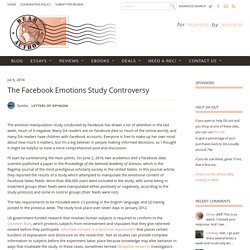
Many DA readers are on Facebook (like so much of the online world), and many DA readers have children with Facebook accounts. Everyone is free to make up her own mind about how much it matters, but I’m a big believer in people making informed decisions, so I thought it might be helpful to have a more comprehensive post and discussion. I’ll start by summarizing the main points.
Emotional Contagion: A People Pattern Study In 3 Parts. This is the first in a series of posts responding to the controversial Facebook study on Emotional Contagion The past two weeks have seen a great deal of discussion around the recent computational social science study of Kramer, Guillory and Hancock (2014) “Experimental evidence of massive-scale emotional contagion through social networks” .
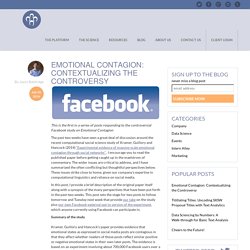
I encourage you to read the published paper before getting caught up in the maelstrom of commentary. The wider issues are critical to address, and I have summarized the often conflicting but thoughtful perspectives below. These issues strike close to home, given our company’s expertise in computational linguistics and reliance on social media. 10 ethical issues confronting IT managers. Should employees be told to what extent their behavior is monitored?
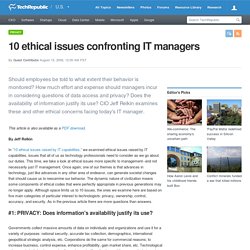
How much effort and expense should managers incur in considering questions of data access and privacy? Does the availability of information justify its use? CIO Jeff Relkin examines these and other ethical concerns facing today's IT manager. This article is also available as a PDF downoad. By Jeff Relkin In "10 ethical issues raised by IT capabilities," we examined ethical issues raised by IT capabilities, issues that all of us as technology professionals need to consider as we go about our duties. . #1: PRIVACY: Does information's availability justify its use? Governments collect massive amounts of data on individuals and organizations and use it for a variety of purposes: national security, accurate tax collection, demographics, international geopolitical strategic analysis, etc.
Trackingsurvey12. Who Owns Photos and Videos Posted on Facebook, Instagram or Twitter? Facebook unethical experiment: It made news feeds happier or sadder to manipulate people’s emotions. Photo by Karen Bleier/AFP/Getty Images Facebook has been experimenting on us.
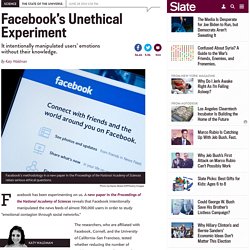
A new paper in the Proceedings of the National Academy of Sciences reveals that Facebook intentionally manipulated the news feeds of almost 700,000 users in order to study “emotional contagion through social networks.” Katy Waldman is Slate’s words correspondent. The researchers, who are affiliated with Facebook, Cornell, and the University of California–San Francisco, tested whether reducing the number of positive messages people saw made those people less likely to post positive content themselves.
The same went for negative messages: Would scrubbing posts with sad or angry words from someone’s Facebook feed make that person write fewer gloomy updates? They tweaked the algorithm by which Facebook sweeps posts into members’ news feeds, using a program to analyze whether any given textual snippet contained positive or negative words. The Facebook Emotion Study in a Broader Context. Which line matches the first line, A, B, or C?
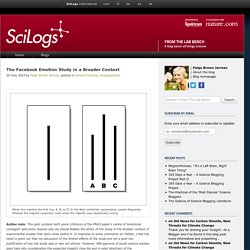
In the Asch conformity experiments, people frequently followed the majority judgment, even when the majority was (objectively) wrong. Author note: This post contains both some criticisms of the PNAS paper's claims of 'emotional contagion' and some reasons why we should debate the ethics of the study in the broader context of experimental studies that have come before it. In response to some comments on Twitter, I feel the need to point out that my discussion of the limited effects of the study are not a post-hoc justification of why the study was or was not ethical.
However, IRB approval of social science studies does take into consideration the expected impacts (how big and in what direction) of the experimental manipulation. Another PNAS paper is inciting some controversy, specifically over whether the experimental manipulation involved was ethical. Scientists: “Facebook had flawed IRB review process!” And a few blog posts:
Everything We Know About Facebook's Secret Mood Manipulation Experiment. It was probably legal.

But was it ethical? Reuters Updated, 09/08/14. Facebook’s Emotional Manipulation Study: When Ethical Worlds Collide. The research community is buzzing about the ethics of Facebook’s now-famous experiment in which it manipulated the emotional content of users’ news feeds to see how that would affect users’ activity on the site.
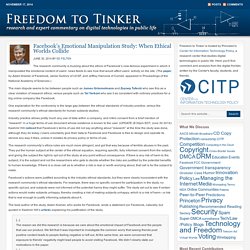
(The paper, by Adam Kramer of Facebook, Jamie Guillory of UCSF, and Jeffrey Hancock of Cornell, appeared in Proceedings of the National Academy of Sciences.) The main dispute seems to be between people such as James Grimmelmann and Zeynep Tufecki who see this as a clear violation of research ethics; versus people such as Tal Yarkoni who see it as consistent with ordinary practices for a big online company like Facebook. One explanation for the controversy is the large gap between the ethical standards of industry practice, versus the research community’s ethical standards for human subjects studies. Facebook Experiment Demonstrates Transfer of Emotional States via Social Media.
The Facebook experiment ran from January 11 to 18, 2012 during which the hundreds of thousands of Facebook users unknowingly participating may have felt either happier or more depressed than usual because they visualized the post of their friend.
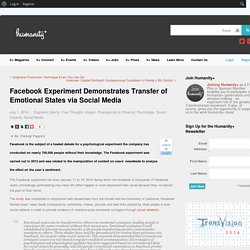
The study was conducted in conjunction with researchers from the Cornell and the University of California, Facebook filtered users’ news feeds composed by comments, videos, pictures and web links posted by other people in their social network in order to provide evidence of massive-scale emotional contagion through social networks. Emotional states can be transferred to others via emotional contagion, leading people to experience the same emotions without their awareness. Emotional contagion is well established in laboratory experiments, with people transferring positive and negative emotions to others. What can we Learn from Facebook's Emotional Contagion Experiment? - Translation Therapy. Can emotional states be manipulated just by the use of emotion-evoking communication?
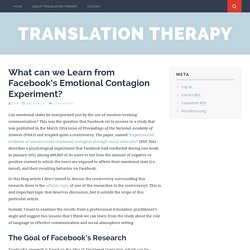
This was the question that Facebook set to answer in a study that was published in the March 2014 issue of Proceedings of the National Academy of Sciences (PNAS) and erupted quite a controversy. The paper, named "Experimental evidence of massive-scale emotional contagion through social networks" (PDF file) describes a psychological experiment that Facebook had conducted during one week in January 2012 among 689,003 of its users to test how the amount of negative or positive content to which the users are exposed to affects their emotional state (i.e. mood), and their resulting behavior on Facebook.
In this blog article I don’t intend to discuss the controversy surrounding this research (here is the official reply of one of the researches to the controversy). This is and important topic that deserves discussion, but it outside the scope of this particular article. Cis200401.pdf. Ethicsdiscussion.html. Four Ethical Issues of the Information Age) By Richard O.

Mason Today in western societies more people are employed collecting, handling and distributing information than in any other occupation. Millions of computers inhabit the earth and many millions of miles of optical fiber, wire and air waves link people, their computers and the vast array of information handling devices together. Our society is truly an information society, our time an information age. Nicholas A. Christakis. Controlling What You See in News Feed. Nicholas Christakis: The hidden influence of social networks. Glitch Brings New Worries About Facebook’s Privacy. Privacy issues of social networking sites. The advent of the Web 2.0 has caused social profiling and is a growing concern for internet privacy.[1] Web 2.0 is the system that facilitates participatory information sharing and collaboration on the Internet, in social networking media websites like Facebook and MySpace.[1] These social networking sites have seen a boom in their popularity starting from the late 2000s.
Through these websites many people are giving their personal information out on the internet. These social networks keep track of all interactions used on their sites and save them for later use.[2] Issues include cyberstalking, location disclosure, social profiling, 3rd party personal information disclosure, and government use of social network websites in investigations without the safeguard of a search warrant. History[edit] Issues[edit] Cyberstalking and location disclosure[edit] Some applications are explicitly centered on “cyberstalking.” Social profiling and 3rd party disclosure[edit] Social networks[edit] Social Network Privacy: Google+ or Facebook for a Safer Experience. …(we’ve been here before with Wave, Orkut and Buzz) and perennial heavyweight Facebook have exploded across the Web in countless articles. Content focus has typically been on friend functionality, comparing user interfaces and in which social situations—work discussions, party photos, blogs about cats, etc.
—you’d use one or the other. But what about privacy—keeping Internet life interactive but safe? We want to be social like a butterfly but not as vulnerable as one. We can take steps to ensure our computers are safe, it’s worth further examining how Google+ and Facebook privacy concerns let you manage your online presence. Your photos At this point in Google Plus’ lifecycle, photo sharing is simple. If you don’t want your images made public, you can adjust your setting to make them "private. " Hitesh Nagda Assignment 2 References.